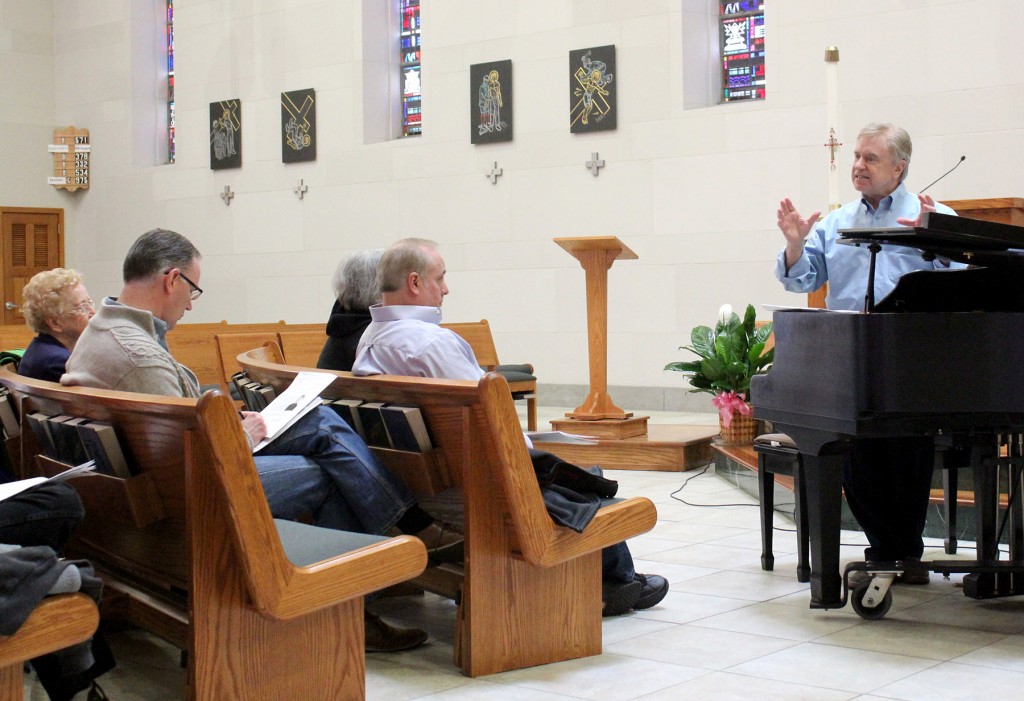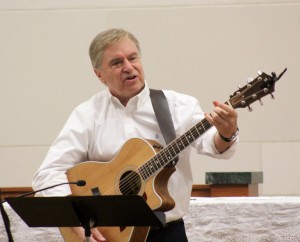“Here I Am, Lord” composer shares stories, gift of music at Quad Cities appearances

Dan Schutte, who has written and recorded music as part of the St. Louis Jesuits and continues to compose liturgical music, told "those who minister at the Lord's Supper" that the most important thing they can do is to help the faithful "give thanks and praise to God, who has given us so much." (The Catholic Post/Jennifer Willems)
DAVENPORT, Iowa — Composer Dan Schutte was welcomed to the Christ the King Chapel at St. Ambrose University like an old friend as he led people through an evening of music and reflection on April 8.
He made it clear from the beginning, however, that it wasn’t going to be a concert.
“The music I’ve written over the years was never intended to be done as a performance,” he said. “It was intended for us to sing as communities of people when we come to pray, to give thanks to a God who has loved us so amazingly much.”
He provided programs for those who attended and encouraged them to sing their hearts out. Many didn’t need them, however, as he gave them opportunities to sing longtime favorites from his St. Louis Jesuit days and beyond, including “Sing a New Song,” “Though the Mountains May Fall,” “Table of Plenty,” “You Are Near” and “City of God.”
There were also some newer compositions, such as “O God, Be the Music” and “Create in Me, O God,” which was written in 2015 and based on Psalm 51.
The song everyone seemed to be waiting for, though, was “Here I Am, Lord” and Schutte didn’t disappoint.
“Songs for me come from many different places,” he said. “Sometimes they’re inspired by things that happen in my own prayer. Sometimes they come from reading Scripture. Sometimes I’ll be sitting at Mass and something will strike me and I’ll say, ‘It would be good to have a song to sing to celebrate this particular moment.’”
And sometimes songs come “out of the blue,” like “Here I Am, Lord.”
Telling his listeners the song had been requested for a Jesuit diaconate ordination — three days before the ordination was to take place — he said he had no idea what he was going to do when he sat down with his guitar 35 years ago.

Dan Schutte paired his reflections on the goodness and unfailing love of god with songs he had written, encouraging people to sing their hearts out. (The Catholic Post/Jennifer Willems)
“It was a striking experience to me how the things you and I do in this world, the works of our hands, whatever we’ve been given to do — to raise families, to educate kids, to be priests, to make music, to care for people in their old age — what we do is not of us,” Schutte said.
“It doesn’t matter how big or how small our work seems to be. Sometimes the things that are the least significant become the most significant because what we do is about God’s power and grace,” he told them. “It’s about God, who gives grace to the things that we do and takes it way beyond.”
In between songs he spoke often of the goodness and mercy of God, who wants only what is best for us and never stops hoping that we will recognize our hunger and thirst for him and seek him out.
MUSIC AND MASS
In addition to his evening of music and reflection, Schutte presented a workshop the following morning “for those who minister at the Lord’s Supper.”
During the workshop he traced the evolution of the Mass, saying that while certain central elements were always part of our communal prayer, it has never been “monolithic” — the same as it always was.
When Jesus ascended into heaven, he didn’t leave the Roman Missal, Schutte explained. “We had to figure it out.”
Because there was no book — or printed material, for that matter — the Lord’s Supper was celebrated in different ways in different communities. It is when the Greeks became followers of Christ that the term eucharistia was adopted.
“‘Eucharistia’ means to give thanks and praise,” he said, noting that for early followers of the Risen Christ the “heart and soul” of Eucharist was about giving thanks and praise for what they saw God doing in their lives.
The ritual has always had elements of gathering around the table and sharing bread and wine. Over time, believers started telling the stories of Jesus’ life and how blessed they were to have had him there, telling them of the “God of our hearts.”
Schutte emphasized that the Scriptures are not just historical stories, but are our stories, too.
Because the Constitution on the Sacred Liturgy calls the Eucharistic Prayer — which includes the consecration of the body and blood of Christ — the “center and summit” of the Mass, the acclamations here become the most important music of the liturgy, he said. As a composer that was foremost in his mind as he set out to write a new Mass setting for the revised texts of the Roman Missal.
The Mass of Christ the Savior was one of 40 new Mass settings released by OCP (Oregon Catholic Press) at the time. That doesn’t include what was offered by GIA Publications and World Library Publications.
CREATIVE CHALLENGE
While there was some flexibility in writing Mass settings for the previous translation of the Roman Missal, a strict adherence to the text was expected this time, according to Schutte.
“The only elasticity they gave us was that a word or phrase could be repeated, but then had to immediately continue,” he said. “It was a tremendous challenge to creativity.”
He found new ways to be creative, however, using musical lines or motifs that repeated throughout the Mass setting to make it easier for people to learn and sing.
Texts may change, but the goal put forth in the Constitution on the Sacred Liturgy remains the same.
“Full, conscious and active participation is the aim to be considered above all else,” he said.
Schutte’s appearances in the Quad Cities were co-sponsored by St. Ambrose University’s Campus Ministry and the Sisters of St. Benedict at St. Mary Monastery in Rock Island, with proceeds going to a new initiative at the Benedictines’ Benet House Retreat Center.
Sister Bobbi Bussan, OSB, retreat house director, said the funds raised would be used for scholarship money to enable local not-for-profit social service agencies to provide a day away at the monastery and retreat center for their clients. Many “just don’t have that kind of opportunity.”
“The not-for-profits are pretty stretched in their funding,” according to Sister Bobbi. “This is a way for us to expand our vision that Benet House and our spirituality ministry are open and we welcome everyone to join us there.”





